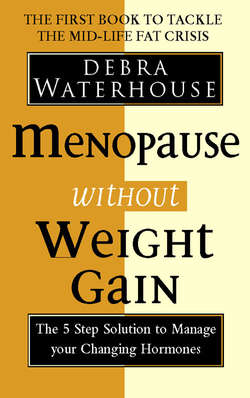Читать книгу Menopause Without Weight Gain: The 5 Step Solution to Challenge Your Changing Hormones - Debra Waterhouse - Страница 19
Unfit Fat Cells Under Stress
ОглавлениеWomen are under more stress than ever before in history. According to the United Nations Report on the Status of Women, we do two-thirds of the world’s work for one-tenth of the world’s wages. We are so stressed doing the work of the world that we don’t have enough time to exercise. Not a good combination. Other than removing stress from your life (a seemingly impossible feat), exercise is the most effective way to tame your body’s response to stress.
During the fight-or-flight response, a release of adrenaline, Cortisol and other stress hormones causes a cascade of reactions to increase your chances of survival – to fight for your life or to flee as fast as you possibly can. The problem with many of the sources of contemporary stress is that fighting or fleeing is unrealistic. You cannot necessarily knock out your boss or run away from a deadline. I guess you could, but then you’d have to deal with the stress of lawsuits and unemployment.
So the stress of day-to-day life keeps building, the stress hormones keep accumulating, and you keep gaining weight. Stress causes additional menopausal weight gain in three ways:
1 Increased fat storage. Stress threatens your fat cells and stimulates more fat-storage enzymes in response to the potentially life-threatening situation. But stress is selective in which fat cells it activates: The thigh area is ignored while the abdominal area is targeted because these fat cells can more easily come to your aid with a burst of energy to save your life.
2 Decreased oestrogen production. From years of stress, your adrenal glands have been so busy producing the stress hormones that they are too worn out to produce the needed testosterone to make oestrogen in your fat cells. To offset lower oestrogen levels, the fat cells in your waist grow bigger and bigger to try to get the job done.
3 Increased stress eating. During the period of recovery from stress, your appetite centre is stimulated, causing you to eat more calories. Stress eating is not just for emotional reasons; it’s also for physiological ones. And when you do eat, the fat-storage enzymes are ready and waiting to store more of the calories in your waist. Stress eating makes your fat cells quite happy.
You may know people who lose weight when they are under stress. We all react differently to major life events and anxiety-producing situations. A few report decreased appetite with stress, but those people who lose a significant amount of weight are usually reacting to more than just commuter traffic or crying children; they may have experienced a death or other traumatic event.
You may know others who maintain their weight when they are under stress – because they’re fit. If you exercise, you know what a wonderful stress-release it can be and how it reduces stress eating. Physical fitness builds up our resistance to stress by metabolizing the stress hormones and helping our bodies to recover. Without exercise, the accumulating stress hormones have a detrimental effect on our fat cells and menopausal experience, causing more hot flushes, insomnia and other discomforts.
Of course, exercise does a lot more than reduce stress. It also directly reduces the size of our midlife fat cells. Aerobic exercise and strength training will be discussed and recommended in upcoming chapters, but as an early plug for fitness, let me share the motivating results of a study conducted at the Washington University School of Medicine. Fit women enter the transition carrying less body fat, and gain less fat during it.
The sedentary women gained nearly 2 stone of fat from their pre-to postmenopausal years – that’s almost two-and-a-half times more than the fit women! No one can argue with these results. Exercise combats menopausal fat!
